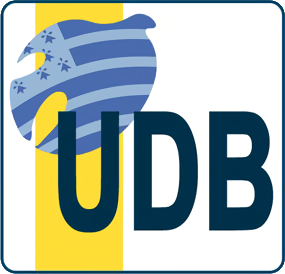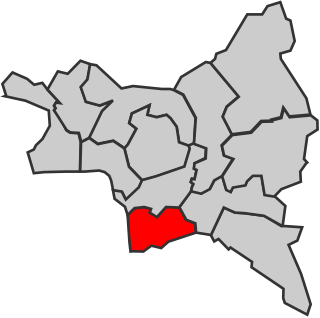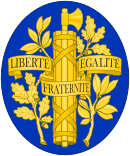
France is a unitary semi-presidential republic with a bicameral legislature. Public officials in the legislative and executive branches are either elected by the citizens or appointed by elected officials. Referendums may also be called to consult the French citizenry directly on a particular question, especially one which concerns amendment to the Constitution.

The French legislative elections took place on 10 June and 17 June 2007 to elect the 13th National Assembly of the Fifth Republic, a few weeks after the French presidential election run-off on 6 May. 7,639 candidates stood for 577 seats, including France's overseas possessions. Early first-round results projected a large majority for President Nicolas Sarkozy's UMP and its allies; however, second-round results showed a closer race and a stronger left. Nevertheless, the right retained its majority from 2002 despite losing some 40 seats to the Socialists.

Breton Democratic Union is a Breton nationalist, autonomist, and regionalist political party in Brittany and Loire-Atlantique. The UDB advocates devolution for Brittany as well as the promotion of its regional languages and its associated culture.

The French municipal elections of 2008 were held on 9 and 16 March to elect the municipal councils of France's 36,782 communes. The first task of each newly constituted municipal council was to elect a mayor.

Cantonal elections to elect half the membership of the general councils of France's 100 departments were held on 11 and 18 March 2001. While the left did poorly in the municipal elections held on the same dates, it emerged as the overall winner in the cantonal elections, gaining control of six departments and losing that of just one.

Cantonal elections to elect half the membership of the general councils of France's 100 departments were held on 9 and 16 March 2008. These elections coincided with the municipal elections, in which the left did well.

The Left Front was a French electoral alliance and a political movement created for the 2009 European elections by the French Communist Party and the Left Party when a left-wing minority faction decided to leave the Socialist Party, and the Unitary Left, a group which left the New Anticapitalist Party. The alliance was subsequently extended for the 2010 regional elections and the 2012 presidential election and the subsequent parliamentary election.

Regional elections were held in France on 14 and 21 March 2010. At stake were the presidencies of each of France's 26 régions, which, though they do not have legislative autonomy, manage sizable budgets.

Cantonal elections to elect half the membership of the general councils of France's 100 departments were held on 20 and 27 March 2011.

Legislative elections took place on 10 and 17 June 2012 to select the members of the 14th National Assembly of the Fifth Republic, a little over a month after the French presidential election run-off held on 6 May.

Europe Ecology – The Greens is a centre-left to left-wing green political party in France. The party is a member of the European Green Party. The party was formed on 13 November 2010 from the merger of The Greens and Europe Ecology.

Seine-Saint-Denis' seventh constituency is a French legislative constituency in the Seine-Saint-Denis département.

Nord's nineteenth constituency is a French legislative constituency in the Nord département. It is one of twenty-one in that département, and covers three cantons in whole or in part : Bouchain, Denain and Valenciennes-Sud.

Departmental elections to elect the membership of the Departmental Councils of France's 100 departments were held on 22 and 29 March 2015. In 2015 for the first time, the term "departmental elections" replaced "cantonal elections", and the term "Departmental Council" replaced "General Council".

Regional elections were held in France on 6 and 13 December 2015. At stake were the regional councils in metropolitan and overseas France including the Corsican Assembly and inaugural seats in the Assembly of French Guiana and Assembly of Martinique, all for a six-year term. The Departmental Council of Mayotte, which also exercises the powers of a region, was the only region not participating in this election, having already been renewed on 2 April 2015. There were 18 regional presidencies at stake, with 13 in mainland France and Corsica, as well as 5 overseas. Though they do not have legislative autonomy, these territorial collectivities manage sizable budgets. Moreover, regional elections are often taken as a mid-term opinion poll.

Legislative elections in France were held on 11 and 18 June 2017 to elect the 577 members of the 15th National Assembly of the Fifth Republic. They followed the two-round presidential election won by Emmanuel Macron. The centrist party he founded in 2016, La République En Marche! (LREM), led an alliance with the centrist Democratic Movement (MoDem); together, the two parties won 350 of the 577 seats—a substantial majority—in the National Assembly, including an outright majority of 308 seats for LREM. The Socialist Party (PS) was reduced to 30 seats and the Republicans (LR) reduced to 112 seats, and both parties' allies also suffered from a marked drop in support; these were the lowest-ever scores for the centre-left and centre-right in the legislative elections. The movement founded by Jean-Luc Mélenchon, la France Insoumise (FI), secured 17 seats, enough for a group in the National Assembly. Among other major parties, the French Communist Party (PCF) secured ten and the National Front (FN) obtained eight seats. Both rounds of the legislative election were marked by record low turnout.

The first Regional Elections of Nord-Pas-de-Calais-Picardie were held on 6 and 13 December 2015. At stake were the Regional Council of Nord-Pas-de-Calais-Picardie.
The Aubervilliers Congress of the Socialist Party (PS) was held on 7 and 8 April 2018 near the Front Populaire station of the Paris Métro in Aubervilliers, Seine-Saint-Denis. The congress determined the political line of the party and elected Olivier Faure as the next First Secretary after the resignation of Jean-Christophe Cambadélis on 18 June 2017.

Regional elections were held in France on 20 June and 27 June 2021. At stake were the regional councils in metropolitan and overseas France including the Corsican Assembly, Assembly of French Guiana and Assembly of Martinique, all for a six-year term. The Departmental Council of Mayotte, which also exercises the powers of a region, also participated in this election, because the departmental elections were held at the same time. Eighteen regional presidencies were at stake, with thirteen in mainland France and Corsica, as well as five overseas. Though they do not have legislative autonomy, these territorial collectivities manage sizable budgets. Moreover, regional elections are often perceived as a mid-term opinion poll. Due to the COVID-19 pandemic, the regional and departmental elections were postponed, first to 13 and 20 June 2021 and then to 20 and 27 June 2021.

The New Ecological and Social People's Union is a left-wing electoral alliance of political parties in France. Formed on May Day 2022, the alliance includes La France Insoumise (LFI), the Socialist Party (PS), the French Communist Party (PCF), Europe Ecology – The Greens (EELV), Ensemble! (E!), and Génération.s (G.s), and their respective smaller partners. It was the first wide left-wing political alliance since the Plural Left in the 1997 French legislative election. Over 70 dissident candidates who refused the accord still ran.

















